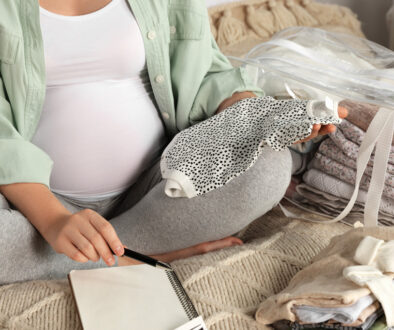The Partner’s Guide To Pregnancy
1. Be Supportive!
From the moment your partner announces she is pregnant, she will be the center of attention and for good reason — she is carrying your child!! Be supportive. It is so helpful for her to feel that she has a partner during this exciting time. Be present. Be curious! You can’t be helpful in the delivery room when you haven’t been paying attention. So read books!
Go to as many prenatal visits as you can, and when you are there, feel free to take notes. She will appreciate an extra set of ears, especially as she is being distracted with blood draws, ultrasounds and exams. There are about 15 prenatal visits (once a month until the 3rd trimester, every two weeks until 36 weeks, and weekly until she delivers).
Pregnancy is a wonderful time for you and your partner to grow closer as you make important decisions together. Some decisions are fun to make together — picking out a baby name, preparing a baby gift registry list, throwing a baby shower.
But some decisions are purely hers — it is her choice if she wants an epidural or not, if she decides she wants her best friend/sister/mother in the room or not, etc.
Taking a birthing class and newborn baby class together can also help you figure out the best ways to support her. Women who have involved and supportive partners are more likely to give up harmful behaviors, have less anxiety and stress, and have better pregnancy outcomes.
She will want to help out as much as she ever did in the past, but she will appreciate you taking the lion’s share of housework and going the extra mile to make her life easier.
Mood swings are not uncommon with hormonal changes occurring in pregnancy. Extreme fatigue can start as early as a positive pregnancy test. After all, in the words of Ali Wong, she’s busy making an eyeball!
Last but not least, COMPLIMENT HER. There’s a good chance she will be feeling self-conscious as her body is going through major changes in a short period of time. She will appreciate the kind words!
2. Stop bad habits
Your partner needs to be her healthiest during pregnancy and you can help her by choosing a healthy lifestyle too! Eat healthy meals, exercise, and stop bad habits such as smoking and recreational drugs. Alcohol is never safe in pregnancy (at any level) and certain recreational drugs may even be life-threatening to both mother and baby.
Smoking increases the risk of fetal growth problems and preterm birth, and secondhand smoke in the house also places the pregnancy at risk. In addition, newborns and children exposed to secondhand smoke are at increased risk of developing asthma, respiratory infections, ear infections, and sudden infant death syndrome (SIDS).
There is also growing evidence that marijuana in pregnancy may be harmful to your developing baby. Support your partner in making the right decisions in her diet and lifestyle by leading by example.
3. Encourage good habits
Your partner needs to prioritize her health and walking is a great way to promote cardiovascular health so that she is ready for labor when the time comes. We recommend moderate-intensity physical exercise (i.e. brisk walking) at least 5 times a week for 30 minutes.
Bedrest is rarely recommended during pregnancy. Regular physical activity during pregnancy helps with weight management, decreases risks of problems (i.e. gestational diabetes), and improves overall mental health by allowing an outlet for stress.
As long as your partner is able to carry on a conversation while exercising, she is likely not overexerting herself. She can discuss with her doctor if she is unsure of which activities she is able to partake in.
If she has led a sedentary life up to that positive pregnancy test, you can encourage a brisk walk with her every morning or evening. Physical activity is important, but also, this is not the time to start training for a marathon if she has never jogged in her life!
In addition, adhering to a healthy diet will encourage your partner to also be healthy. Her body needs a regular supply of good nutrients to provide energy. In general, healthy women with a healthy BMI need 2200 – 2900 calories/day during their prenatal course.
Typically women do not need extra calories during the first trimester and often they do not gain much weight (or even lose some weight) during the first trimester due to food aversions and nausea. During the second trimester, we recommend an additional 340 calories/day and for the third trimester, an extra 450 calories/day for women of a healthy pre-pregnancy BMI.
4. Download Rex pregnancy app
Want to keep up with your partner regarding pregnancy milestones? She already knows that her baby is the size of an orange at 18 weeks, but now you can too with the help of the free Rex pregnancy app!
This app is provided by Rex Hospital for free so that your partner and you can track how far along you are in the pregnancy, stages in labor, the types of interventions that are done during labor, signs of labor… you name it! It’s an app-specific to the hospital she will deliver at and it’s FREE.
5. Be Proactive!
You typically will take your baby home 2-3 days after delivery. You and your partner will not be able to bring home your baby until you install a rear-facing car seat.
You can go to www.safecar.gov for tips on choosing and installing the car seat that is best suited for your new addition. In addition, Rex Hospital has a car safety program — the free car-seat assistance and installations are just one of the numerous services they offer at Rex Women’s Center. Inspection hours are 9 AM-1 PM on weekdays.
Appointments are not necessary but to ensure there is a technician on duty, call ahead at (919) 784-1802.
In addition, to alleviate some anxiety for your partner, you can help her by setting up an organized room just for your baby. Take the time for baby proof the house. Taking a tour of the hospital will also provide some relief.
Mapping the best route to the hospital and knowing where the parking lot is so these things are one less thing to worry about when your partner is in labor! Preprogram important numbers (i.e. your clinic number) and plan for child care ahead of time if you have other children.
Cook some meals ahead of time and place them in the freezer so your first few weeks home with the baby are less stressful.
Lastly, check your work company for paternity benefits. Many companies offer paternity leave. Research how long this time is and the policies around time off for a prenatal visit.
6. Get Vaccinated
Flu season is October to May, and we recommend both you and your pregnant partner get a flu shot. Everybody in the house who is 6 months and older should get the flu vaccine each year.
In addition, everybody who will be in contact with the newborn should also receive a Tdap vaccine at least two weeks prior to delivery.
7. Be aware of your partner’s feelings
During labor and delivery, it is common for your partner to feel overwhelmed in addition to excited and nervous. You can be helpful by distracting her! Watch a movie together, play card games, or making a birthing playlist.
You can also help her relax with massages and allowing her to take plenty of naps during early labor by reminding friends and family members that she needs rest.
After delivery, attention is always toward the new baby but remember who did the hard work! It is not uncommon for new mothers to feel upset, sad, guilty or anxious after delivery for various reasons.
“Postpartum blues” is common in the first couple of weeks, and sometimes an even more severe condition can develop called “postpartum depression.” You may notice that her feelings of sadness, anxiety or guilt worsen over the weeks, or other signs develop such as decreased appetite, withdrawal from friends and family, inability to care for the baby, or trouble concentrating develop.
In these cases, encourage her to seek professional help by contacting her doctor. It is possible that you can develop postpartum depression as well — talk to a healthcare professional if you notice symptoms as well.
8. Is it ok to have sex?
Unless your partner’s doctor has told you otherwise, sex is generally safe during pregnancy as long as your partner is comfortable. You may need to try new positions to help with discomfort as your partner gets further along in pregnancy. Spotting is not uncommon after sex, but you should stop if more brisk bleeding is noted and contact the doctor
After delivery, we recommend 6 weeks before becoming sexually active again to reduce the chance of infection as well as to ensure she has had a discussion with her doctor regarding birth control options.
It is important to know that even if a woman is completely breastfeeding or not having a period, she can still get pregnant. Therefore, it is recommended that she chooses a birth control method prior to having intercourse again. In cases of a vaginal tear that occurred during delivery, some women may need to wait longer to ensure the area has healed completely.
9. Surprise your pregnancy partner with gifts! (Because who doesn’t like to get gifts?)
Some Ideas:
- Prenatal cradle (a belly band)
- Pair of compression socks
- Comfortable shoes
- Big pillow to help her sleep
- Ear plugs and an eye mask for labor and delivery





